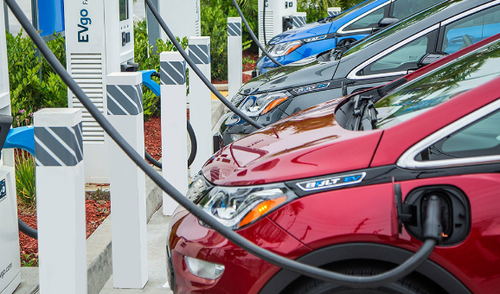
The European Union has officially started their anti-subsidy investigation into Chinese electric vehicles.The EU is investigating because it claims that emerging data indicates a probable surge in government-backed, low-cost imports, putting an already fragile EU sector at immediate risk.
The inquiry will focus specifically on newly produced electric vehicles intended for carrying nine or fewer passengers; motorcycles, however, are not part of the current probe and the investigation is expected to wrap up within a year, according to an update by Bloomberg on Wednesday morning.
Bloomberg also reported that overnight heading into Wednesday, stocks of Chinese electric vehicle manufacturers like BYD and Geely Auto declined following the "official" initiation of the investigation.
BYD's stock plummeted up to 3.8%, while shares of Geely Auto fell by 2%. XPeng saw a 4.3% dip, Li Auto decreased by 1.3%, and Great Wall Motor's shares slid 1.8%, Bloomberg noted.
China's Ministry of Commerce objected to the investigation, claiming it "is solely based on assumption and lacks sufficient evidence," Bloomberg reported.
We noted days ago that Tesla's EVs would be included in the investigation. EU executive vice-president Valdis Dombrovskis said in late September that there was “sufficient prima facie evidence” to support the probe. We had previously written about the EU's investigation and Beijing's response via The Global Times.
Dombrovskis said he was "constantly pressed by his Chinese counterparts about the probe" after a five day trip to China, FT wrote.
“The EU is now probably the largest market which is open for Chinese producers,” he commented, defending the investigation. He said that the EU was "open to competition" but that it "needs to be fair".
During his recent trip to Beijing, Dombrovskis aimed to convince Chinese officials to remove numerous trade barriers that European firms argue led to last year's unprecedented trade imbalance of nearly $400 billion.
Both parties reported some advancement, unveiling a new system to address export controls, a move that echoes a similar initiative between China and the United States. Furthermore, China agreed to increase purchases of agricultural products from the EU.
However, China didn't hesitate to express its discontent over the ongoing anti-subsidy investigation, a topic that came up in every discussion, according to Dombrovskis.
As we noted last month, China responded to the investigation via The Global Times, claiming that the EU's probe would likely "backfire" and that the EU's economy would suffer as a result. The publication said that "...as the EU wields trade protectionist measures to suppress China's EV industry, the European economy may suffer."
The article claimed that the EU isn't bothered by the subsidies, but rather "the rapidly growing market influence of Chinese EV companies" and "the concern that homegrown European enterprises may be unable to compete."
"Clearly, Europe is afraid," The Global Times wrote. "They are afraid of competition from China, so they want to seek trade protectionism as a protective umbrella for European auto makers who are slowly transitioning toward electrification." China added that the EU should "have enough courage to face competition from their Chinese counterparts directly."
The European Union has officially started their anti-subsidy investigation into Chinese electric vehicles.The EU is investigating because it claims that emerging data indicates a probable surge in government-backed, low-cost imports, putting an already fragile EU sector at immediate risk.
The inquiry will focus specifically on newly produced electric vehicles intended for carrying nine or fewer passengers; motorcycles, however, are not part of the current probe and the investigation is expected to wrap up within a year, according to an update by Bloomberg on Wednesday morning.
Bloomberg also reported that overnight heading into Wednesday, stocks of Chinese electric vehicle manufacturers like BYD and Geely Auto declined following the “official” initiation of the investigation.
BYD’s stock plummeted up to 3.8%, while shares of Geely Auto fell by 2%. XPeng saw a 4.3% dip, Li Auto decreased by 1.3%, and Great Wall Motor’s shares slid 1.8%, Bloomberg noted.
China’s Ministry of Commerce objected to the investigation, claiming it “is solely based on assumption and lacks sufficient evidence,” Bloomberg reported.
We noted days ago that Tesla’s EVs would be included in the investigation. EU executive vice-president Valdis Dombrovskis said in late September that there was “sufficient prima facie evidence” to support the probe. We had previously written about the EU’s investigation and Beijing’s response via The Global Times.
Dombrovskis said he was “constantly pressed by his Chinese counterparts about the probe” after a five day trip to China, FT wrote.
“The EU is now probably the largest market which is open for Chinese producers,” he commented, defending the investigation. He said that the EU was “open to competition” but that it “needs to be fair”.
During his recent trip to Beijing, Dombrovskis aimed to convince Chinese officials to remove numerous trade barriers that European firms argue led to last year’s unprecedented trade imbalance of nearly $400 billion.
Both parties reported some advancement, unveiling a new system to address export controls, a move that echoes a similar initiative between China and the United States. Furthermore, China agreed to increase purchases of agricultural products from the EU.
However, China didn’t hesitate to express its discontent over the ongoing anti-subsidy investigation, a topic that came up in every discussion, according to Dombrovskis.
As we noted last month, China responded to the investigation via The Global Times, claiming that the EU’s probe would likely “backfire” and that the EU’s economy would suffer as a result. The publication said that “…as the EU wields trade protectionist measures to suppress China’s EV industry, the European economy may suffer.”
The article claimed that the EU isn’t bothered by the subsidies, but rather “the rapidly growing market influence of Chinese EV companies” and “the concern that homegrown European enterprises may be unable to compete.”
“Clearly, Europe is afraid,” The Global Times wrote. “They are afraid of competition from China, so they want to seek trade protectionism as a protective umbrella for European auto makers who are slowly transitioning toward electrification.” China added that the EU should “have enough courage to face competition from their Chinese counterparts directly.”
Loading…





